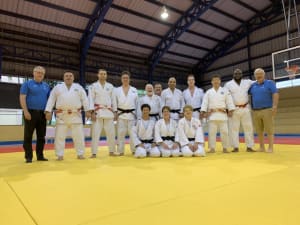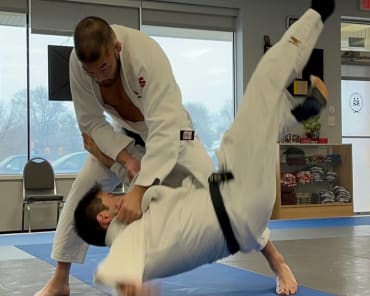
I have just returned from spending a grueling week in Santo Domingo, Dominican Republic completing the IJF Academy's Level 2 course. Upon completion of this course, I am now a Level 5 European Coach. We spent the week under the guidance of Daniel Lascau (1991 World Champion from Romania), Mark Huizinga (3x Olympic Gold Medalist from the Netherlands) and Mikihiro Mukai (Kodokan Kata specialist). Throughout the week, the faculty was a little intimidating but they were very supportive throughout the whole process. Each day consisted of 6hrs on the mat (3 in the morning and 3 in the afternoon). There were 8 Americans and about 20 Dominicans (many of whom I completed Level 1 with). The first day of the course, we had to complete our final written exam --- the culmination of 12 weeks of E-learning on topics such as Biomechanics, Nutrition, Sports Injury Management, Judo History/Culture, Refereeing, Training Methodology, Sports Organizations, Coaching Principles and Periodization. Some sessions involved some high intensity workouts which allowed us to see how others train outside of the US. They were tough workouts, but everyone was smiling at the end. They introduced us to new training tactics, drills, games, techniques and a few motivational talks. Throughout the day, we would refine our Katame No Kata with Mukai Sensei -- the kata that demonstrates ground techniques (and escapes) from pins, chokes, and joint locks. It had to be performed with a high level of technique -- so I had to perform perfectly with a partner that I had just met a day before. She was from Bolivia, and luckily, we got along really well! After passing that exam, we had to develop in-depth lesson plans for each type of throw (hand, foot, hip and sacrifice) and each type of newaza (choke, pin, submission), typed up nice in Times New Roman 12. As we were not aware that we had to bring a laptop with us, we all wound up sharing 3 computers (mine being one of them.... luckily I brought it just in case I wanted to review some judo videos) well into the early hours of the morning. It was a little hectic, but we wound up bonding and creating some very memorable moments. We had to demonstrate the basic version, then onto variations of it, different grips, different escapes (if applicable), different movements, different situations that you would see it, combinations in and out of the technique, different drilling exercises, stretches, warmups and fighting exercises. It allowed us to fully understand our favorite technique. On the day of the exam, we would present our 7 lesson plans, and the senseis would pick out one throwing technique and one ground technique. Most of the time, they picked our favorite technique because in the end, they wanted us to shine and guide us into making a strong judo program for our students. Everybody in the program passed!
The IJF Academy is one of the most rewarding programs that I have participated in. A lot of coaches in the US knock it because they don't want to take the 1000 falls of level 1 -- but if you think about it, you get to dish out 1000 throws! You realize fairly quickly the importance of knowing how to fall properly and how thankful you are that you do know how to fall properly. It really refreshes and updates your judo. It gives you a new sense of accomplishment and hunger for sharing this knowledge with the world. There were people of all ages at this "training camp" in both Level 1 and Level 2 -- from an 18 yr old kid who just got his black belt to the 40yr old judo instructor (me!) to the ex-Olympic athlete (there were 3 of them at my session!!!) to the 68yr old 7th dan who is always eager to learn something new. The IJF has done a fantastic job with this course, and I hope that every judoka that I know would be able to complete this course.




